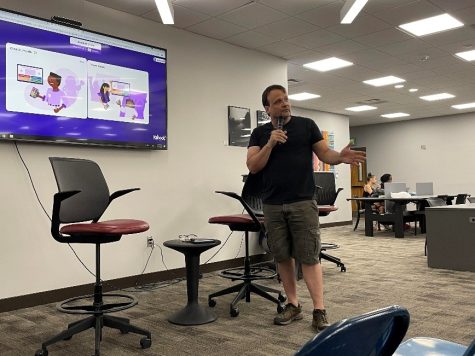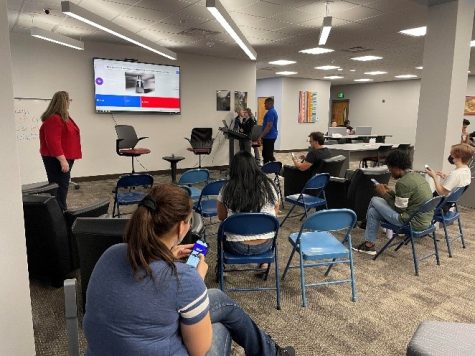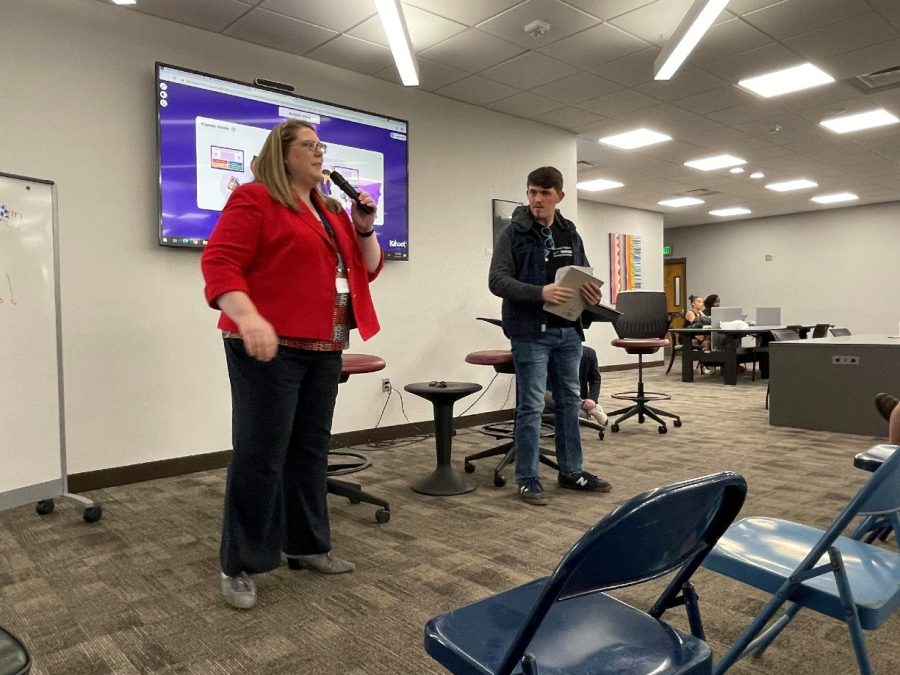CF raises awareness for autism through open mic event
April is Autism Awareness Month, which aims to raise awareness about autistic people and behaviors and foster acceptance in society.
This past Wednesday, April 13, CF hosted an open mic event in the Stearns Learning Resources Center for Autism Awareness Month. Students were encouraged to step up and share their experiences.
“We wanted to give the opportunity to other students to participate in spreading awareness to their fellow peers and help our friends feel included,” said Tony Sinsay, 20, a member of the Student Activities Board.
Students came forward to share their stories, ranging from stories of their struggles in the community to joyous poetry embracing autism.
“We often don’t ask enough questions and are afraid to ask questions, so having someone share their experience breeds awareness,” said Mary Ann Begley, director of diversity and inclusion.

Kevin Levites, 55, was one of the people who spoke at the event. He wanted to detail his experiences with autism.
“I’ve been angry about the consequences of autism for a long time and certain problems I see are not being addressed,” said Levites.
Levites spoke about some of the struggles he has faced in classes due to his autistic mannerisms. He discussed the use of Honorlock and how it can put autistic students at a disadvantage.
“I have to use Honorlock, which would interpret my autistic mannerisms as academic dishonesty,” said Levites. “If a professor asks if you were dishonest, because we have problems with eye contact and body language, we’re automatically interpreted as being dishonest.”
Additionally, Levites discussed some of the “ignorant” statements others have said to him, particularly while attempting to receive accommodations.
“A typical example of something that’s been said to me is, ‘If you’re smart enough to be in college and write a book, then you’re smart enough to know how to not be autistic,’” said Levites.
Levites also said that he’s been told if he “made normalcy his special interest, he would be normal” and he “chooses to be autistic.”

According to Neurodiverging.com, a special interest is “when a person has an intense focus on a specific subject, and wants to learn about the subject or think about that subject, above all else.”
By implying autistic people “choose” to be autistic and should intensely focus on being “normal,” it disregards the struggles they face and the accommodations they need.
“I’ve been told, ‘If I give you these accommodations, I’m enabling you,’ like someone might enable an alcoholic,” said Levites. “These are the battles I have to fight while I’m trying to get an education.”
Through this event, Levites was able to share his experiences with other students and staff and express his frustrations, and he hopes that those who attended will better understand autism and its traits.
“I hope students and staff will gain greater awareness and have more of an open mind, as well as understand how sensory issues can sabotage academic performance and don’t reflect on somebody’s willingness to work,” said Levites.
CF prides itself on inclusion and aims to ensure minority students are heard. Click here to see last month’s open mic event for Women’s History Month.
“When we’re talking about diversity and inclusion, we want to make sure that everyone on campus is seen and heard and has a sense of belonging,” said Begley.
If you are interested in attending similar events to learn more about the diverse voices across the CF campus, click here to see upcoming events.
Your donation will support the student journalists of College of Central Florida. Your contribution will allow us to purchase equipment and cover our annual website hosting costs.




Joshua Simmons • Jan 14, 2023 at 11:02 pm
I am very sorry to hear how you have been treated, Levites! I work with children who have autism along with other behavioral challenges; I see the struggles you have faced more than I would like to. I am proud of you for continuing to push forward for your education despite those who are not knowledgeable or rude. I hope some changes have been and will be made to give you and others the accommodations needed to succeed.
Kevin Levites • Mar 3, 2023 at 11:03 am
Thank you very much.
I believe that one of the issues with people obtaining accommodations for autism has to do with the idea that autism is on a spectrum, which means that every autistic person’s needs will be different.
This lack of uniformity means that people believe that autistic people are using their autism as an excuse and/or ploy to “get their way.”
It was even considered theraputic and psychologically beneficial to hit and slap autistic people in the face in order to “shock them into reality.” I myself had to endure similar (although less severe) treatments when I was younger.
This philosophy is probably part of why many older people don’t accept autism, and believe that autism is a result of “no discipline,” no “home correction,” and/or a “lack of character.”
I get extremely angry because I see a very similar process now when politicians think that they know better than doctors when it comes to treating “trans” children.
Sometimes I just want to withdraw from society and live on my own private island.
Thank you for your comments.